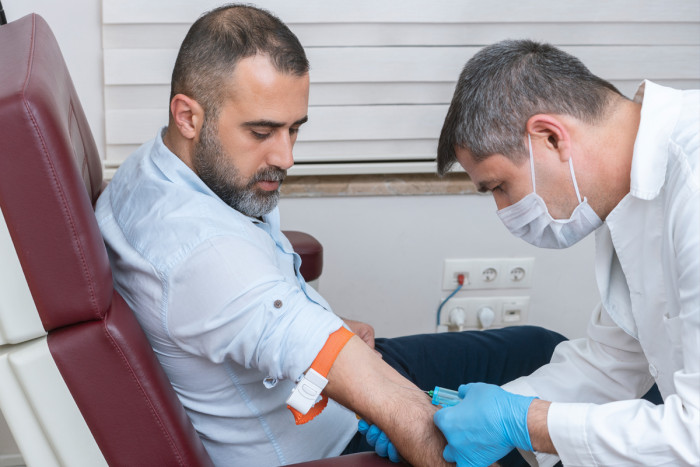Phlebotomist
Kaitiki Toto
Alternative titles for this job
Phlebotomists collect blood and samples from patients for laboratory testing or for blood banks.
Pay
Qualified phlebotomists usually earn
$52K-$82K per year
Source: Te Whatu Ora, 2023
Job opportunities
Pay
Pay for phlebotomists varies depending on experience.
Phlebotomists working for Te Whatu Ora Health NZ (former DHBs)
- Qualified, registered phlebotomists usually earn $52,000 to $82,000 a year.
Sources: Auckland Region District Health Boards/ PSA, 'Allied, Public Health, Scientific & Technical Multi Employer Collective Agreement, Expires 30 June 2023'; and 'Rest of New Zealand 'Allied, Public Health, Scientific and Technical Multi Employer Collective Agreement, expires 30 June 2023.'
- Te Whatu Ora website - Auckland Region Allied, Public Health, Scientific and Technical Multi Employer Collective Agreement (PDF - 1.46MB)
- Te Whatu Ora website - Rest of New Zealand 'Allied, Public Health, Scientific and Technical Multi Employer Collective Agreement (PDF - 1.88MB)
- PAYE.net.nz website - use this calculator to convert pay and salary information
(This information is a guide only. Find out more about the sources of our pay information)
What you will do
Phlebotomists may do some or all of the following:
- take blood and other samples such as plasma and skin
- label samples and collect patient data
- input data into computers
- reassure patients and blood donors
- look after patients if they have an adverse reaction
- travel to collect samples from patients
- test patients for allergies
- maintain machinery and order supplies
- attend blood donation events.
Skills and knowledge
Phlebotomists need to have knowledge of:
- the anatomy of the arm, and blood-taking techniques
- how to take a variety of other bodily samples
- health and safety requirements, and hygiene
Working conditions
Phlebotomists:
- often do shift work and may work weekends
- are likely to work part time, in the mornings, if they work for community medical laboratories
- work in hospital laboratories or community medical laboratories, donor centres or mobile collection units
- may travel locally to take samples at doctors' surgeries, hospitals, rest homes, patients' homes and workplaces.
Entry requirements
To become a phlebotomist you need to:
- work as a trainee phlebotomist in an approved laboratory for two years
- gain the Qualified Phlebotomy Technician Certificate, Qualified Donor Technician Certificate or Qualified Specimen Services Technician Certificate from the New Zealand Institute of Medical Laboratory Science
- hold a full driver's licence.
You also need to be registered with the Medical Sciences Council of New Zealand.
The Vulnerable Children Act 2014 means that if you have certain serious convictions, you can’t be employed in a role where you are responsible for, or work alone with, children.
Secondary education
There are no specific secondary education requirements to become a phlebotomist. However, biology, chemistry, health education, physics and maths are useful.
Additional requirements for specialist roles:
Donor Technician
Specimen Services Technician
Personal requirements
Phlebotomists need to be:
- responsible
- tolerant, patient and gentle
- able to inspire confidence in patients and put them at ease
- practical, and able to pay attention to detail
- able to follow procedures and instructions
- organised, with basic computer skills
- good communicators with good listening skills.
Phlebotomists should not be squeamish, as their work involves body samples.
Useful experience
Useful experience for phlebotomists includes:
- customer service
- training and working as a nurse or health care assistant
- work in laboratories, particularly in the specimen reception area
- work in hospitals, particularly in medical laboratories.
Physical requirements
Phlebotomists need to be reasonably fit and healthy, as they spend long periods standing. They also need to have good hand-eye co-ordination for finding veins when taking blood samples.
Registration
Phlebotomists need to be registered with the Medical Sciences Council of New Zealand.
Find out more about training
- Medical Sciences Council of New Zealand
- (04) 801 6250 - msc@medsci.co.nz - www.mscouncil.org.nz
- New Zealand Blood Service
- 0800 448 325 - www.nzblood.co.nz
- New Zealand Institute of Medical Laboratory Science (NZIMLS)
- (03) 313 4761 - cpd@nzimls.org.nz - www.nzimls.org.nz
What are the chances of getting a job?
Opportunities best for experienced phlebotomists
Chances of getting a job as a trainee phlebotomist are average due to high competition for entry-level roles.
Your best chance of getting work as a trainee phlebotomist is to:
- approach laboratories directly
- be willing to work part time in the morning, when there is more demand for tests
- have good customer service experience.
Chances are best for experienced phlebotomists.
According to the Census, 900 phlebotomists worked in New Zealand in 2018.
Types of employers varied
Phlebotomists work for:
- private laboratories
- hospitals
- the New Zealand Blood Service.
Sources
- APEX and Northland Pathology, 'Collective Employment Agreement', August 2021, (www.apex.org.nz).
- Broadbent, J, continuing professional development and membership co-ordinator, New Zealand Institute of Medical Laboratory Science, careers.govt.nz interview, February 2021.
- Medical Sciences Council of New Zealand, 'Medical Laboratory Pre-Analytical Technician', accessed January 2021, (www.mscouncil.org.nz).
- New Zealand Blood Service website, accessed January 2021, (www.nzblood.co.nz).
- Stats NZ, '2018 Census Data', 2019.
- Stats NZ, 'National Population Projections: 2020 (base)-2073', 8 December 2020, (www.stats.govt.nz).
(This information is a guide only. Find out more about the sources of our job opportunities information)
Progression and specialisations
Experienced phlebotomists may progress into managerial positions.
With further training, they may become medical laboratory scientists.
Phlebotomists may specialise in the roles of:
- Donor Technician
- Donor technicians collect blood and plasma from blood donors.
- Specimen Services Technician
- Specimen services technicians take blood, urine and tissue from patients to test in a laboratory. They also perform tests and procedures on patients.
Last updated 25 March 2025


